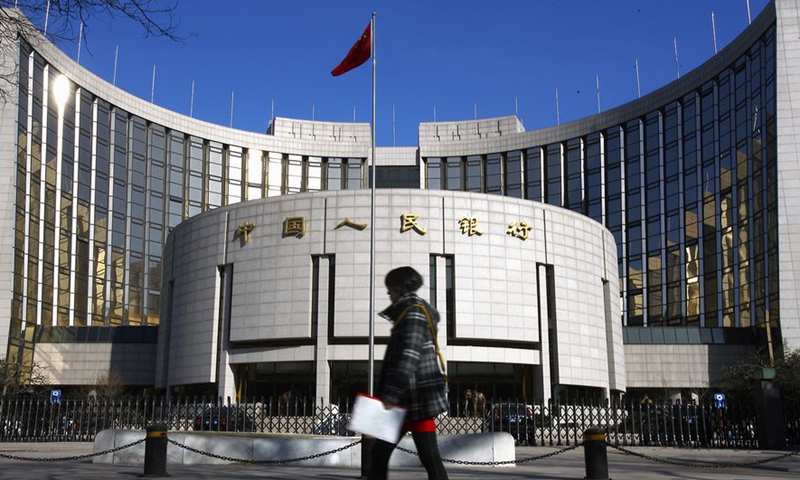
A file photo shows a pedestrian walks past the headquarters building of the People's Bank of China in Beijing, capital of China. (Xinhua)
China trimmed more than $21 billion of its holdings of US Treasury bonds in August to the lowest level since 2010, in what experts call a move to avoid financial risks amid concerns for a potential debt crisis in the US.
According to the US Treasury Department, China's holdings of US Treasuries dropped to $1.047 trillion in August, down $21.3 billion from the previous month.
China remains the second-largest non-US holder of the Treasuries after Japan, which had $1.319 trillion at the end of August.
The reduction of US debt holdings has always been a market decision, and China has a set of algorithms and professional institutions that operate and judge whether it should buy or sell US debt, Gao Lingyun, an expert at the Chinese Academy of Social Sciences in Beijing, told the Global Times on Tuesday.
Given the US economic situation, global concerns about a potential US debt default are rising, which also led to a reduction of US debt holdings, Lian Ping, head of Zhixin Investment Research Institute, told the Global Times on Tuesday.
As of early September, the US federal debt exceeded $28.7 trillion.
Although the US House of Representatives has passed a provisional appropriations bill to ensure that the federal government has sufficient funds to operate until December, the unresolved debt ceiling issue has made the debt crisis into a "Sword of Damocles" for Washington, which also puts the world's economy at risk, analysts said.
The status of US Treasury debt has already been greatly diminished, and more countries might join the diversification efforts, Lian said.
If the US continues to squander its international credit, allows its fiscal deficit to expand, and abuses economic and financial sanctions to engage in economic bullying, the US dollar will eventually lose its status as a global "safe harbor". The decline of the US dollar's hegemony is only a matter of time, analysts warned.
Apart from economic considerations, some domestic financial institutions could sell off US Treasuries out of concerns about deteriorating China-US ties, Lian said.
Experts noted that amid years of China-US tensions, economic exchanges between China and other economies like the EU and ASEAN are on the rise, resulting in a growing need for the central bank to increase holdings of other currencies.
Other major US bond holders, namely Japan and UK, all increased their holdings of US debt. Japan increased its holdings of US debt by $9.6 billion to $1.319 trillion in August this year. Japan surpassed China to become the largest creditor of the US in June 2019, and maintains that place until today.
"The buying of US debt by Japan and the UK may be driven by political factors, more than market behavior," Lian said.
Global Times


